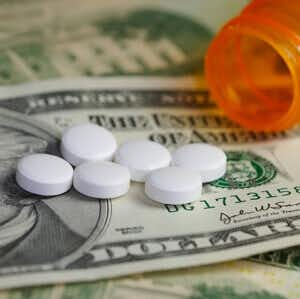
Generic drugs were originally developed as a way for people to save money…lots of money! The idea is that the generic manufacturer does not have to spend the big bucks on proving that a given drug is safe and effective. That has already been done by the brand name manufacturer. The testing that generic drug makers must do proves that their product is bioequivalent to the original pricey product: that is, that it is absorbed into the bloodstream and reaches similar blood levels as the brand-name drug. This is far less expensive than the research and development conducted by brand-name firms. Consequently, generic producers are supposed to be able to offer their products at ultra-low prices.
What Do Generic Drugs Cost?
Many are really affordable. Some generic drugs are dirt cheap. Just think of the medications sold at $4 for a month’s supply in some of the big-box stores. Profit margins may be slim, but these businesses do not operate as charities. They are not giving their drugs away. We won’t go into the quality control concerns we have raised in the past. You can check out an overview about that at this link.
Prices Have Been Rising:
Nonetheless, the past decade has seen prices rising rapidly on a large number of generic medications. For example, the price of the blood pressure pill captopril soared by 2,800 percent in one year alone, from 2012 to 2013 (Alpern et al, New England Journal of Medicine, Nov. 13, 2014). Albendazole, an old drug used to treat parasitic infections, went from $5.92 for a daily dose in 2010 to $119.58 per day in 2013.
Why are generic drug companies charging so darn much? Part of the reason is that they can. Unlike many other countries in the world, the United States does not exercise any control over drug pricing. Both brand name and generic drug companies get to set their own prices. That may be what the market will bear.
This makes sense for the makers of brand name drugs: they have marketing exclusivity. But generic drugs could presumably be made by any drug manufacturer. As a result, there should theoretically be price-lowering competition among them.
Competition or Collusion?
In a recent move, however, attorneys general of 45 states claimed that several large generic drug companies have been colluding rather than competing. They have named 18 companies and 15 different medications in the suit, which also singles out two drug company executives.
The Connecticut Attorney General kicked the suit off in December.
At that time, he told reporters:
“…we have evidence of widespread participation in illegal conspiracies across the generic drug industry. Ultimately, it was consumers – and, indeed, our healthcare system as a whole – who paid for these actions through artificially high prices for generic drugs.”
He has since convinced 44 other state attorneys general plus the AG for the District of Columbia to join the battle.
This week he stated:
“It is our belief that price-fixing is systematic, it is pervasive, and that a culture of collusion exists in the industry.”
You can learn more about the history of this gigantic mess in an article we wrote almost a year ago titled:
Giant Generic Drug Scandal: Companies Accused of Price Fixing!
Where Is the Investigation Headed?
Two former executives of Heritage have been cooperating with the investigation, after paying $25,000 each in fines. The latest developments have added a number of additional pharma firms, including Mylan, Sandoz, Sun Pharmaceutical Industries, Par Pharmaceutical, Dr. Reddy’s Laboratoris, Apotex Corp, Lannett Company, Ascend Laboratories and Zydus Pharmaceuticals.
You may not recognize any of those generic drug companies. They are not generally household names in the U.S. Many people are familiar with brand name companies such as Merck, Lilly or Pfizer. But if you look at your bottle of generic medicine you might be surprised to see one of the companies listed above.
The Expanding Probe:
When the suit began, the plaintiffs had named only two drugs: slow-release doxycycline (an antibiotic) and glyburide (a drug to lower blood sugar in type 2 diabetes). With the recent expansion, they have added several other drugs, including more diabetes medicines, an antibiotic, blood pressure pills, an anti-anxiety drug and a medication used for both glaucoma and epilepsy.
The states’ lawsuit is not the only thorn in the pharma firms’ side. Apparently, the US Justice Department is also investigating possible criminal collusion.
A Word of Caution:
To date there have been no convictions that we are aware of. What we do have are attorneys general accusing many generic drug manufacturers of price fixing and collusion. And there are the two former executives of one company who pleaded guilty earlier this year and paid fines.
We are anxiously awaiting further news on what could eventually become one of the biggest scandals to affect the generic drug industry. In fact, this could turn into the biggest pharma phreak out ever.
Learn More:
Until this mess is sorted out, you will want to arm yourself against high drug prices (brand or generic). You will also want to learn more about quality and how to use generic drugs wisely. You can find tips on how to protect yourself in our Guide to Saving Money on Medicines.

